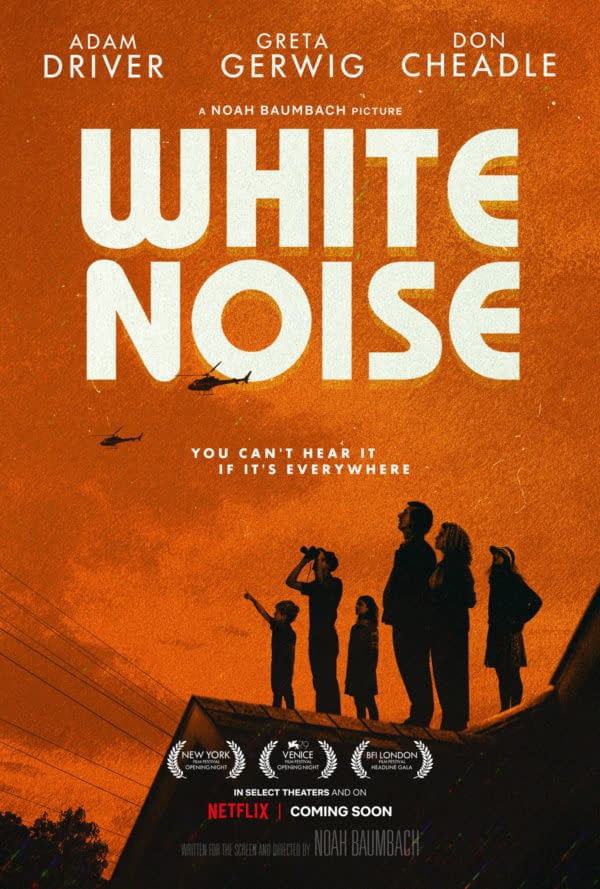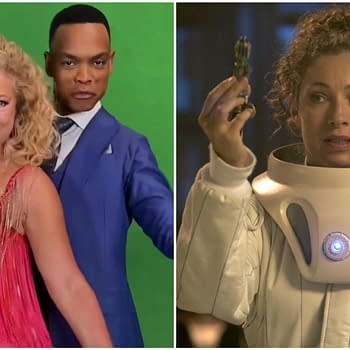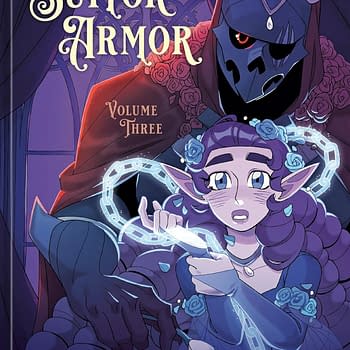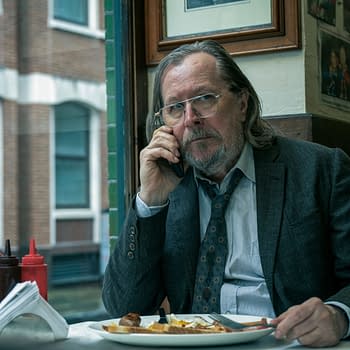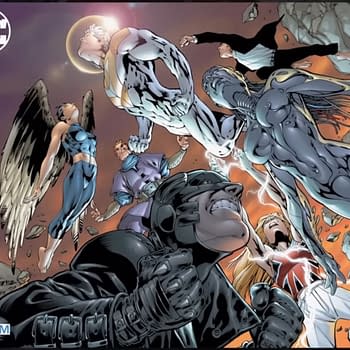Posted in: Movies, Netflix, Review | Tagged: adam driver, don delillo, greta gerwig, netflix, noah baumbach, Steve Spielberg, white noise
White Noise Adapts a Difficult Novel with Hilarious, Surreal Results
Don DeLillo's award-winning 1985 novel White Noise has been a white whale for many filmmakers since the 1980s. It's a dense, non-naturalistic satire of 80s consumer culture, academia, and apocalyptic existential dread that many critics have deemed unadaptable for the screen. Somehow, Noah Baumbach got to make the movie that has eluded so many others, with Netflix footing the bill. We watched it after reading many mixed to outright negative reviews and found it a hoot.
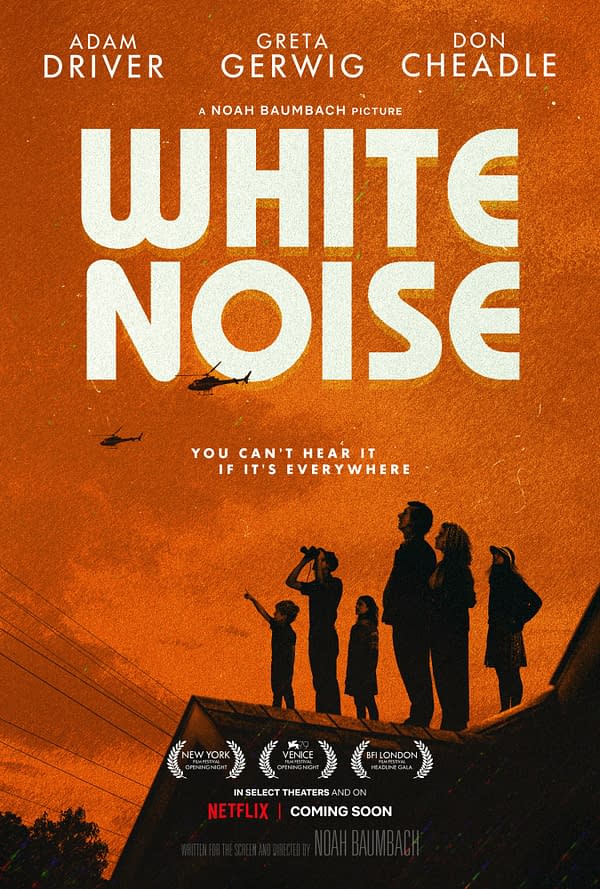
Adam Driver plays an esteemed university professor named Jack Gladney who has carved out a niche teaching Hitler Studies, which is just a pretentious way to describe the history of Nazism. Greta Gerwig plays his bubbly wife, Babette, who seems to be secretly slipping an unknown medication to stabilize her mood. However, their kids are starting to notice she's acting weird with long lapses in memory. Their 80s sitcom-style life is disrupted by an industrial accident involving a train carrying toxic chemicals, resulting in an "Airborne Toxic Event" that prompts a mass evacuation of their town to a camp where panic and chaos ensue. Gladney believes he's been exposed to the contaminated air, which puts him at potential risk of death… years and years from his exposure. That's not the point. The point is the fear and uncertainty just exacerbate his existential dread that was always bubbling under his façade of professorial certainty, and now his entire outlook on life is thrown into a tailspin even as Babette seems to be going off the deep end because of her seeming addiction to that mysterious medication.
White Noise: The Clue is in the Title
As a novelist, Don DeLillo writes elliptical, sometimes cryptic dialogue that nobody ever speaks in real life. This might be why the movie has been so polarizing for many reviewers and viewers. Every character in White Noise talks not to each other but at each other with factoids, platitudes, opinions, and declarations, sometimes to the point of abstraction. Baumbach lifts the book's dialogue wholesale into the movie without compromise, which might have alienated some of the audience, but if you're able to vibe with it, you might find it very funny. The lines are like a cross between deconstructionist discourse and Harold Pinter. If this was all in French with subtitles, it might be mistaken for "deep." The key here is the title of the movie. After a while, everything everyone says is white noise. The film not only keeps the novel's commentary on how the age of too much information means understanding very little but also turns it into a commentary on our current age of misinformation where hardly anyone knows anything.
When Academia Gets Useless, Pretentious, and Plain Dumb
Both the book and the movie poke at the pretentious and useless decadence of academia from the start, like Don Cheadle as a fellow professor teaching a course about the car crash as an aesthetic experience past the violence and hoping to establish his own niche as a professor of "Elvis studies." The scene where Cheadle and Driver give dueling lectures in the same room to draw a parallel between Elvis and Hitler is so deeply decadent, useless, pretentious, and stupid that it becomes incredibly funny, possibly the ultimate in-campus satire. The campus scenes will feel familiar to anyone who has survived liberal arts college and the ridiculousness of increasingly decadent and useless academic classes.
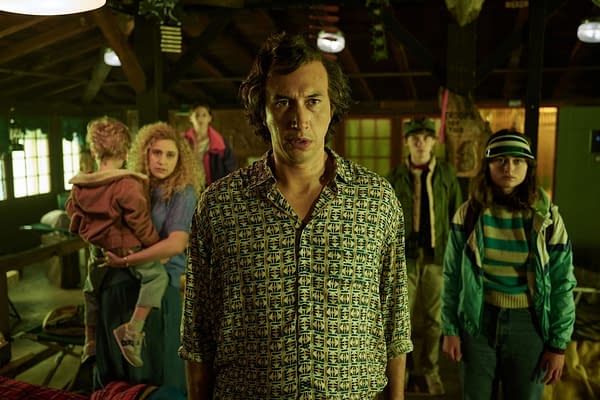
White Noise is an Anti-Spielberg Nightmare Farce
White Noise is a satire of the consumer-capitalist culture of the time. Instead of celebrating or fetishising the glamour of cocaine and pop culture in the 80s, it shows what a shitshow the 80s was, where people spent their time obsessing over the most meaningless and useless things. Not everyone was on cocaine or hanging out at Studio 54 in New York City. Most Americans were living in the suburbs with their kids, just living lives of consumption. That's the American Way. This is the antithesis of Stranger Things, which is a loving homage to the 1980s and Spielberg movies. White Noise is like the snarky Euro-infused indie arthouse flipside, a slightly mean-spirited spoof of Spielberg's 80s films. In the movie's midsection, where the Gladney's are caught in a panicked mass evacuation like in a disaster movie, Baumbach replaces Spielberg's sentimentality and wonder with existential horror and Kafkaesque absurdity. It's like if you hit Spielberg in the head with a brick a few times and forced him at gunpoint to direct this story. It's an anti-sentimental look at the 1980s American family played out as an existential comedy.
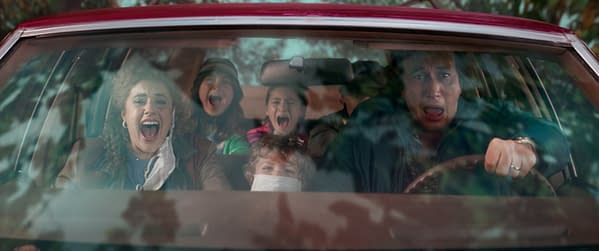
Driver is funny as a pompous, ridiculous man who takes himself very seriously to hide his deep wells of insecurity. He and Gerwig make a hilarious double act as a couple who overthink and overtalk everything, two goofy people who don't realise how goofy they are, but their actors do. Baumbach draws on the visual style and pacing of 1980s sitcoms for White Noise, but instead of the cozy, comforting feel of sitcoms, it pushes it to the point of surrealism and discomfort. When the apocalyptic disaster hits, the movie falls into a rabbit hole of Kafkaesque absurdity with the fear of death looming over Gladney, who's so trapped inside his head that he can't even feel any fear without burying it under endless academic platitudes. He still must solve the mystery of Babette's increasingly erratic behaviour, which pushes him way out of his comfort zone and into violence and horror. In the end, this is a horror-comedy about a man trying to keep his family and sanity together in the face of domestic and apocalyptic chaos.
That final silly dance number in the supermarket at the end of White Noise is an allegory for 80s consumerism as people shop to avoid thinking about life and death. Like it or not, Baumbach has a definite point of view on how he's adapting a novel that might be unadaptable. It's a valiant attempt, and whether it works depends on whether it clicks with you. It's a campus satire, a disaster movie, and a medical mystery rolled into one, but Baumbach and DeLillo make it a very strange film. No studio will greenlight anything like this ever again.
Does it work? We're not sure, but it made us laugh a lot.
White Noise is streaming on Netflix.
